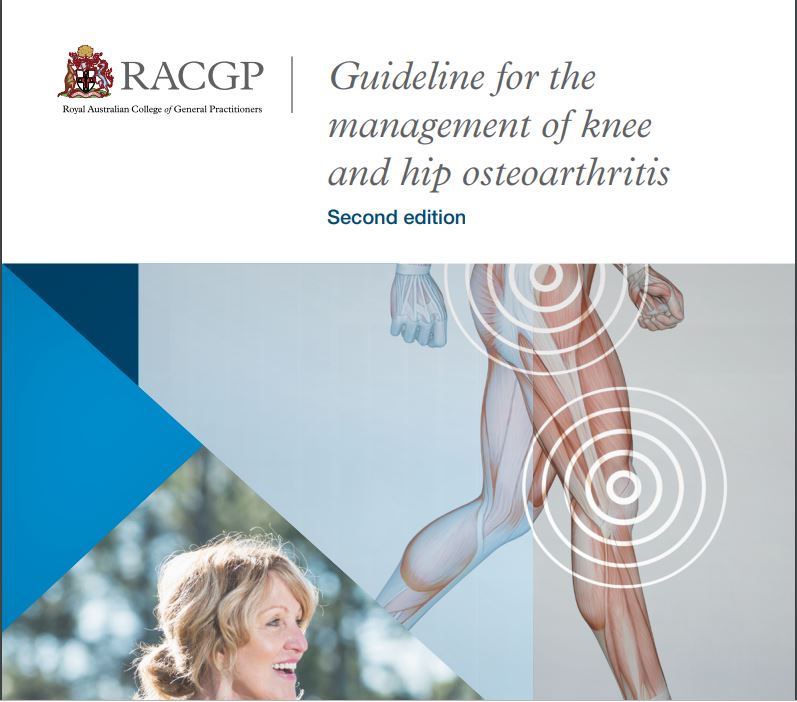RACGP Guidelines for the Management of Hip & Knee OA
Full Guide here
 Key Summary
Key Summary
Lifestyle:
• Regular exercise is important for relieving pain and improving function in people with knee and/or hip OA. For knee OA, land-based exercise such as muscle strengthening exercises, walking and Tai Chi are strongly recommended. Other land-based exercise that could be considered for some people with knee OA include stationary cycling and Hatha yoga. The best land-based exercise for people with hip OA could not be determined because of limited research. Aquatic exercise may be considered for some people with knee and/or hip OA.
• Weight management is strongly recommended for people with knee and/or hip OA who are overweight or obese.
Non-drug treatments:
• Cognitive behavioural therapy (CBT) could be considered for some people, particularly in conjunction with exercise, and taking into account existing mental health conditions, personal preference, cost and access.
• Heat packs or hot water bottles may be applied as a self-management strategy.
• Using a cane or other devices (eg walker, crutches) may be appropriate for some people with knee and/or hip OA to help improve pain, mobility and balance.
• A short course of manual therapy or massage could be considered for some people with knee and/or hip OA as an adjunct to lifestyle management.
• Transcutaneous electrical nerve stimulation (TENS) that can be used at home may be appropriate for some people with knee and/or hip OA.
• There is a conditional recommendation against the following treatments (refer to Section 3. Recommendations for an explanation on conditional recommendation)
– therapeutic ultrasound
– shockwave therapy
– laser therapy
– interferential therapy
– footwear marketed for knee OA
– cold therapy
– valgus braces and lateral wedge insoles for medial knee OA
– patellofemoral braces
– kinesio taping.
Due to a lack of high-quality evidence, no recommendation can be made for the following
– formal self-management programs
– varus unloading braces and medial wedge insoles for lateral knee OA
– shock-absorbing insoles
– arch supports
– patellar taping
– pulsed electromagnetic/shortwave therapy.
Medication:
• Nonsteroidal anti-inflammatory drugs (NSAIDs; eg ibuprofen), taken orally at low doses for short periods are recommended for some people with knee and/or hip OA. Monitoring for possible adverse effects of the drugs is necessary.
• Although there is no recommendation either for or against NSAIDs applied locally to the skin, it may be reasonable to trial topical NSAIDs for a short period, with monitoring of possible adverse effects, then discontinue use if not effective.
• Although there is no recommendation either for or against paracetamol, it may be reasonable to trial paracetamol for a short period in some people with knee and/or hip OA, with monitoring of possible adverse effects, then discontinue use if not effective.
• Corticosteroid injections could be offered for short-term symptom relief for some people with knee and/or hip OA, but care should be taken with repeated injections because of potential harm.
• Duloxetine could be considered for some people with knee and/or hip OA when other forms of pain relief are inadequate.
• There is a strong recommendation against the use of the following
– oral and transdermal opioids
– viscosupplementation injection for hip OA
– doxycycline
– strontium ranelate
– interleukin-1 (IL-1) inhibitors
– stem cell therapy.
There is a conditional recommendation against the use of the following
– capsaicin for knee and/or hip OA
– bisphosphonates
– calcitonin
– anti-nerve growth factor (NGF)
– colchicine
– methotrexate
– viscosupplementation injection for knee OA
– dextrose prolotherapy
– omega 3 fatty acids
– diacerein.
Due to a lack of high-quality evidence, no recommendation can be made for the following
– injections of platelet-rich plasma (PRP)
– nonsteroidal anti-inflammatory creams applied locally
– capsaicin for hip OA
– collagen
– methylsulfonylmethane.
Complementary and alternative therapies, and nutraceuticals:
• The following complementary and alternative therapies should not be offered
– glucosamine and chondroitin nutraceuticals
– vitamin D
– acupuncture.
• Due to a lack of high-quality evidence, no recommendations can be made about the following herbal supplements
– avocado/soybean unsaponifiables (ASU)
– Indian frankincense (Boswellia serrata extract)
– turmeric
– pine bark extract.
Surgical interventions:
• There is a strong recommendation against surgery such as arthroscopic lavage and debridement, meniscectomy and cartilage repair for people with knee OA, unless the person also has signs and symptoms of a ‘locked knee’.
